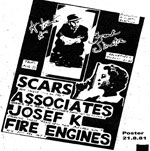
There was a great
line in Robert Elms’ In Search Of The Crack where one of the clubbing
socialist characters is walking round with a copy of the Telegraph sticking
out of his pocket, on the grounds that it pays to know your enemy.
I’ve
bought the Telegraph twice recently to get free DVDs, and was
surprised to see Paul Morley had a short column on music. It seemed sad
in a way.
When Domino Records released its Codex Teenage Premonition set of Fire
Engines demos and live recordings it shrewdly used the text of a feature Paul
Morley wrote on the group for the New
Musical Express in 1981. It was over-the-top in its enthusiasm and exuberance.
It was argumentative and provocative. It was totally pop, and still seems exciting
in every possible way.
Morley was one of the music writers that grew out of the punk explosion, and
went shooting off at strange tangents, exploring and foraging. He wrote for the NME,
and went on to become something of a celebrity as part of the ZTT set-up, and
then lingering as a talking head should someone be needed to pontificate on popular
culture for a late night TV show no one will watch.
Sounds was the somewhat less fashionable and much more lightweight rival
to the NME, and there between say 1979 and 1983 pop writer Dave McCullough
would cover much the same ground as Morley in as distinctive and just as excitable
a way. But with a few exceptions he has largely been written out of the pop history
he sought to shape.
One of those few exceptions is Simon Reynolds’ Rip It Up And Start Again,
an exploration of the post-punk and new pop that McCullough was such an evangelist
for. As part of his extensive research Reynolds worked his way through the
back pages of the music papers in the British Library, which must have been
a disorientating
exercise. Most of those back pages are buried somewhere at the back of my mind,
jumbled up with memories of Postcard and Zoo Records, Swell Maps and Blue Orchids,
Nightingales and Pere Ubu, the first James EP and the first Wake LP, and all
the other adventurers McCullough fought for.
Thinking about McCullough as the underdog and unsung hero prompted me to do a quick search on the internet to see which devoted fans had posted arcane articles of their idols for posterity. Led by that strange Google-d illogic I stumbled across articles and reviews he’d written on Scars, Magazine, and Aztec Camera, and a few others.

1981 was a huge year for McCullough. Or maybe it was for me? A friend challenged me and said that we look back on the music we grew up with as the best ever because we were there, but I dunno. 1981 was special. It started with McCullough raving about Vic Godard’s 'Stop That Girl' single, averring that Vic was god, and marvelling at his pure-Abba choruses. Within days he was back in Scotland, writing excitedly about Postcard Record’s latest signing Aztec Camera as a post-Fall band, and that from The Fall “they have gleaned a realism and a sense of adventure, and to that they have added a naturalism of their own design.” He goes on excitedly to state that “like the equally quixotic Orange Juice, the Aztecs seem to have calmly forgotten about 20 years of depressing r’n’r history. Aztec Camera deserve, in fact need to be separate from the whirly world of mainstream r’n’r, the world of fat men and big signings, of ill conceivedness and arbitrariness.”
Although he was first to write about many of the era’s big stars, such as Specials, Undertones, Wham!, The Smiths, and James, McCullough would often state that he was in opposition to the music business. He seemed pretty separate from the whole circus. There was, apparently, little by way of bond with his contemporaries like Morley and Penman. You never got the sense they all went drinking and plotting together. He just loved music, wanted to share the groups and sounds he was fortunate enough to find, and let his passion flow through all he wrote.
As a person, there’s little to tell about McCullough. He graduated to Sounds from the fanzine Alternative Ulster, which had close links to The Fall, where he wrote as Dave Angry, and all I know he was at one time rumoured to be involved with the start of the Blanco y Negro label with Rough Trade’s Geoff Travis and Cherry Red’s Mike Alway, and later another underground label with a before-Creation’s Alan McGee, but the business side of things was not for him, and he was maybe I’ve heard a little too difficult to get on with. He would move from Sounds to London listings magazine City Limits, where memorably he wrote about Makin’ Time as the antidote to REM rock orthodoxy, and rightly claimed their Fay Hallam to be god. After that, who knows? He just disappeared from view.

The next interview a year on has Scritti Politti with a new found pop confidence, and a great new song to remember called 'Confidence'. McCullough talks of Confidence as bringing “all the prominent Scritti influences together. There’s still that loose, brusque rhythm section chopping out a pure concrete bass, hinting at jazz and chiefly reggae influences, above which Green’s wonderful voice and guitar playing presents a genuinely original focal-point, making me think of rock-based folk influences, like Richard Thompson, or other great obscure voices like Robert Wyatt or Hatfield and the North or Family. Green himself talks of being on the attack and cutting the idealistic cackle, dispelling McCullough’s doubts that Scritti were “a little placid perhaps, a little stationary and comfortably revolutionary”.
Two more years on, and the Scritti set Songs To Remember is finally ready, and Green’s been busy talking to The Face, Smash Hits, and the real teen pop publications. McCullough loves the record, indeed it epitomises his own new pop aspirations, and Green’s enjoying himself, doing the pop thing. McCullough writes about “this silver-tongued boffin-cum-critic of after-punk turned babbling wide boy”. Green argues that “you’ve got to be really careful otherwise you’re wasting your diy-time these days. Things have changed incredibly in two, three years. The whole political climate of the country’s changed. Generally things have moved on. That’s why I find it really surprising that more groups haven’t done the same sort of radical change as we’ve done. Really turning things round every two years, totally revising and revamping your ideas. I’m quite looking forward to our next change!”
In that final interview Blackpool no-hopers and empty vessels the Membranes are cast as fools, accusing Scritti of diy betrayal and bad mouthing. Green, however, describes the underground labels as “worthy but infuriating”, citing the example of Rough Trade failing to capitalise on the Mighty Diamonds’ 'Pass The Coutchi', which was a big US disco favourite, but got buried here. Green rages: “I think there’s some people at Rough Trade who’ve still never heard of the record, never knew they’d even released it. That’s really dreadful.” And I bet that even in their wildest dreams neither Green nor McCullough would dare to imagine someone as out there and up there as Missy “Misdemeanour” Elliott would still be signing that song 20 odd years on.
© 2006 John Carney